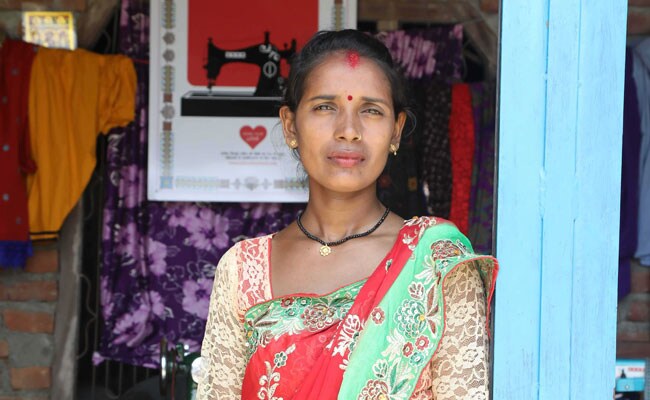- Home/
- From Bihar To Nepal: Sangeeta's Journey Of Struggles
From Bihar To Nepal: Sangeeta's Journey Of Struggles

"My father-in-law came home after about five years of work in Malaysia as a laborer" she said when asked about what prompted her to enroll herself for the sewing school. "He always inspired us to work with the skills in hand. With his earning he enrolled me in the Usha Silai School to learn tailoring."
Once she started her 7-day training at the Usha Silai School, she began learning different styles of stitching and soon became a master at tailoring women's garments.
CARE Nepal, an organisation aimed at empowering the poor, vulnerable and socially excluded people so as to fulfill their basic needs and help them achieve social justice in Nepal, seeing Sangeeta's determination to work, offered her assistance to start her own sewing school.
With the monetary help she received she purchased an interlock machine and got repair work done in her house to start holding sewing classes there. She says with pride and with a sense of gratitude to her in-laws who have supported her throughout the journey,
Usha Silai School, a programme that has changed the lives of many underprivileged women in India and beyond. It has helped women like Sangeeta who have been looking for opportunities to sustain themselves.I am the first woman in my family who has been able to start a business by sewing. I have trained over ten women till now. After they got married, they, too, have received support from their family which has helped them become tailors.
Today, Sangeeta is well versed in stitching skirts, shirts, pants, school uniforms, bags and so on. As her earning stabilised and increased, she managed to pay off her loans as well. Sangeeta is not just proud of her career growth, she is also happy for those women whom she has managed to help by training them. "Out of all the women I have taught, 2-3 women have started their own sewing schools" she said.Despite knowing stitching, I never earned from it until I took the formal training. Now, I have been in this profession for 3-4 years and can do more than the nine techniques that I was taught during training period. Sometimes, when I see different kinds of stitching designs on television, I make a mental note of it and try re-creating those."
To her, stitching has given her those opportunities that she had only hoped for earlier. "I would feel sad when my husband would refuse to give me money. Now that I have my own income, I no longer need to ask for it or explain why I spend it."
Also Read: Moving Towards A Fearless Future, Soni From Nithari Village Takes Charge Of Her Life
Related Stories
More- Team NDTV | Monday February 16, 2026
Odisha's Suchismita Sahu, Rajasthan's Preeti Prajapat, Manipur's Akhirun—Usha Silai School's Kushalta Ke Kadam celebrates these awardees, from homemakers to master trainers earning accolades
- Team NDTV | Thursday February 12, 2026
From Ladakh peaks to Assam fringes, Usha Silai School trains tribal women in Turtuk, Kargil & Dakhinkuchi—crafting livelihoods with armed forces, NHPC & NGOs. Stitching national resilience
- Team NDTV | Thursday January 29, 2026
From West Bengal's transgender tailors to Telangana's tribal seamstresses and Meghalaya's embroidery revivalists, Usha Silai School's Kushalta Ke Kadam partners with NIRDPR and state governments
- Team NDTV | Tuesday February 03, 2026
In Odisha's mining heartlands, Mahanadi Coalfields Limited teams with Usha Silai School's Kushalta Ke Kadam and Gram Utthan, empowering tribal women turning them into entrepreneurs
Adopt a Silai School
About the Initiative

Kushalta Ke Kadam, an initiative by USHA Silai School and NDTV has entered its eighth season. The aim is to empower more women across rural India by teaching them sewing skills and helping them open new doors of opportunities for themselves. The initiative encourages rural women to become financially independent and entrepreneurs by taking up sewing and training others in their respective communities.
Since 2011, the USHA Silai School initiative has trained more than 12 lakh rural women through over 33,000 Silai schools, spanning over 20,751 villages across India.
The women earn Rs. 4,000 – 5,000 per month on an average, with the highest recorded monthly earning being Rs. 84,000 in a month. This earning works as a catalyst towards building their self-confidence, reducing gender inequities, and raising their stature within their families and in society at large.
In Pics

Rebari girls grow up learning traditional embroidery, which along with their new found sewing skills developed at Usha Silai Schools, is helping them earn a living.

Usha Silai School has empowered many rural women to support their family and send their children to school.

The Usha Silai School, established in a small nondescript village that goes by the name of Kottai, is helping empower people from varied communities.

The all-inclusive Usha Silai School Programme covers the entire nation from hamlets tucked between hills to villages cast by the sea.

Vegetables farmers from the Mizoram hills earn very little given the topography of the area. Usha Silai Schools have played an important part in this region by skilling women to financially contribute towards their households.

Usha Silai School learner Lucy has trained seven other women in her community, helping them to become financially independent.

Women like Kaviben from the nomadic Rebari community are finally laying down their roots as they begin to gain financial independence and thereby stability through Usha Silai School.

Usha Silai School, located in the Gujarat's Bhuj village, is enabling rural women to earn as much as Rs. 2,500-4,000 each month.

Usha Silai School, in association with a Gujarat based NGO called Kala Raksha, is trying to bring about a Silai revolution in Bhuj.

Besides training other women from their community, many Usha Silai School learners have become entrepreneurs in their own right.

With sewing becoming easily accessible and lucrative, the silai schools are also helping revive traditional motifs and designs.






